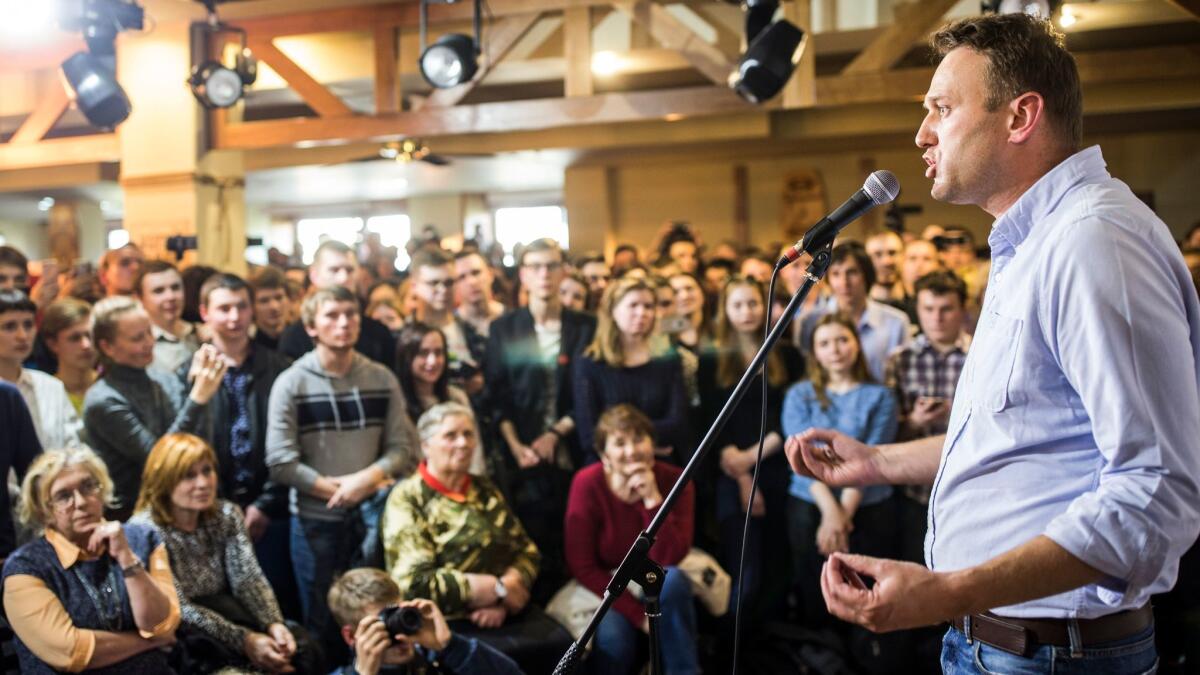Here’s why Vladimir Putin should fear Russia’s millennials: They bypass state-controlled media
- Share via
Reporting from Ramenskoye, Russia — Stepan Vyboch is a 22-year-old ecology major who started his own YouTube channel to discuss his views on Russia’s big issues. Some of his videos are political. Others are snippets of events in Ramenskoye, the university student’s suburban hometown about 30 miles south of Moscow.
Bright, technically savvy and politically active outside of Moscow’s liberal cosmopolitan circles, Vyboch is exactly the kind of millennial Russian who has taken the Kremlin by surprise.
Vyboch has registered with the Ramenskoye city government to hold an anti-corruption protest on Monday, one of about 220 demonstrations planned across Russia in response to opposition leader Alexei Navalny’s call for huge street marches. Protesters say they want answers to claims of government-sponsored corruption brought out in Navalny’s 50-minute YouTube video about Prime Minister Dmitry Medvedev.
The video exposed what Navalny’s Anti-Corruption Foundation says is an intricate corruption scheme that has allowed the prime minister to amass lavish mansions and feed an expensive shopping habit. The video has been viewed more than 22 million times on YouTube, according to Serafim Orekhanov, a Russian journalist who has been following the online culture of Russian youth.
Navalny, who says he hopes to challenge President Vladimir Putin for president in 2018, has urged his followers to come out and surpass the number of participants seen on March 26, when tens of thousands of demonstrators turned out across 80 Russian cities. It was the biggest street demonstration in Russia since 2012. Hundreds were arrested that day across the country, including Navalny.

Many of the participants on March 26 were, like Vyboch, young adults between 18 and 22, a new demographic of activism that sent shock waves through the Kremlin.
The youth turnout showed the Kremlin that its controlled messaging on state-owned and controlled television and news outlets had missed a new generation of Russians, who see YouTube and social media networks as their main source of news and entertainment, Orekhanov said.
Part of the success of Navalny’s YouTube channel, known as Navalny LIVE, is the star himself. At 41, Navalny isn’t just a talking head or an old-school politician. He doesn’t lecture, but instead gives straight talk in a way that is relatable to a younger generation, Orekhanov said.
“Traditional news is an old-fashioned concept to this generation,” Orekhanov said. “YouTube has become what television was to the older generations.”
The Kremlin has responded with awkward attempts to quash youth involvement both in the streets and online.
Human Rights Watch said there has been an orchestrated government campaign to intimidate Russian students and young adults planning to participate, according to a recent statement from the organization.
“Rather than responding to legitimate public demands for accountable government, the Russian authorities are trying to quash the voices of the next generation of voters,” Hugh Williamson, the Europe and Central Asia director at Human Rights Watch, said in a statement.
The Duma, Russia’s parliament, has introduced bills that would restrict the use of social media for users under 14 and ban the use of virtual private networks, which can circumvent blocked websites. Another law would require online messaging services to register with the Russian authorities, potentially exposing their subscribers’ details to government sources.
Such intimidation techniques only served to motivate Vyboch more, he said.
“The reason for the protest is to demand answers from the government to these questions about corruption,” Vyboch said. “But really, my goal is to teach people how to get out on the streets and shout.”
Vyboch’s generation was born after the breakup of the Soviet Union and raised in a new world dominated by social media networks and news video clips. Unlike their parents’ generation, these people rarely get their news from traditional mainstream media in Russia.
Our problem as independent media is not with the Kremlin silencing us. It’s with money. Like all journalism, we need more money.
— Sergei Smirnov, editor of Mediazona, an independent news portal
As a result, young Russians have learned to circumvent the Kremlin’s tight grip on the media to find news and entertainment through social networks and channels such as Telegram, WhatsApp, Instagram, YouTube and Facebook.
“As long as we have the means to still do things with different mediums, we should use them,” Vyboch said. “Now it’s difficult to see what could happen in the future, so we must live in the moment.”
The idea that there is no independent media in Russia is not entirely true, said Sergei Smirnov, the editor of Mediazona, an independent news portal dedicated to covering court cases and breaking news. The site has earned a reputation for its unbiased and consistent coverage of both high profile cases, such as those involving Navalny, and smaller cases involving Kremlin crackdowns on dissenting voices.
Unlike the Chinese government, the Kremlin isn’t able to shut down the entire Internet, Smirnov said. “They simply don’t have that technology or capability.”
But what it can do is pressure advertisers to stay away from certain media, limiting significant sources of revenue. One of Russia’s most popular independent news outlets, Rain TV, recently moved to a subscription-based paywall system, something that more sites are looking into.
“In that sense, our problem as independent media is not with the Kremlin silencing us,” Smirnov said. “It’s with money. Like all journalism, we need more money.”
Smirnov, who frequently appeared on Navalny’s YouTube channel as a guest speaker, said that independent outlets are quickly learning how to get their stories out on various platforms, so “if they did try to shut our site down, we know we could always use other methods to get our stories out.”
In his most recent YouTube video (link in Russian), Vyboch sits at his desk and talks to the camera about the new Russian film “Loveless,” which won a jury prize at the 2017 Cannes Film Festival.
The dramatic film has been called a commentary on the failures of the Russian state, and Vyboch, speaking to his YouTube subscribers, quickly draws parallels to the film and the current situation both in his city of 150,000 and in Russia.
“Discussing this movie can also help us to understand that it all is very interconnected — corruption, domestic problems,” he said to the camera. “Considering this might help find the roots of our problems. And those roots are all coming from one place. Come to the protest on June 12 at 14:00. Let’s talk, argue, let’s get to the roots of these problems.”
Ayres is a special correspondent.
Twitter: @sabraayres
ALSO
Ukraine blocks popular Russian-owned social media sites, saying it’s a matter of national security
A grim pattern in European attacks: Missed chances to pinpoint terrorism suspects beforehand
More to Read
Sign up for Essential California
The most important California stories and recommendations in your inbox every morning.
You may occasionally receive promotional content from the Los Angeles Times.











